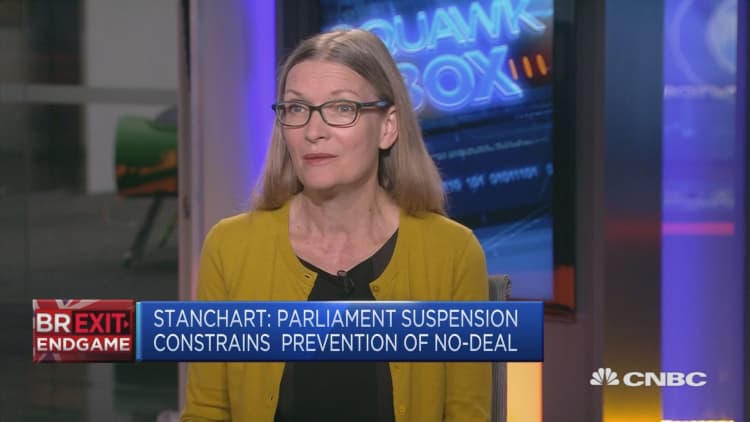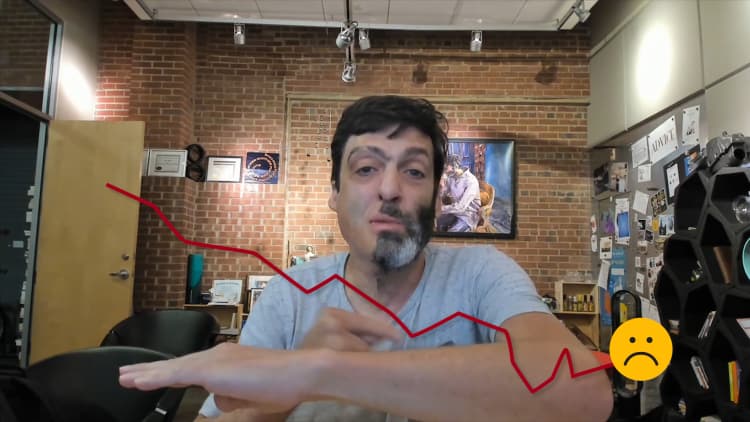Analysts at top global banks are divided on what U.K. Prime Minister Boris Johnson's controversial suspension of parliament will mean for Brexit.
The possibility of Britain exiting the bloc with no deal has been at the heart of the debate since Johnson took office, vowing to leave on the October 31 deadline with or without a new withdrawal agreement.
Johnson announced Wednesday that parliament would be suspended from September 9 until a Queen's Speech on October 14, leaving lawmakers seeking to block a no-deal exit little time to pass legislation, with Members of Parliament (MPs) only returning from a summer recess on Monday.
While some strategists at major banks have upped the probability of a no-deal Brexit in light of the "proroguing" of parliament, others are maintaining a "wait and see" approach, especially in light of Johnson's vow to ramp up negotiations with Brussels.
No-deal Brexit draws closer
In a note to clients published Thursday, J.P. Morgan economists Malcolm Barr and Allan Monks pushed the probability of a no-deal Brexit up from 25% to 35%.
They cited the time now available for MPs to force an alternative, assuming Johnson's move survives legal and political challenges. No-deal opponents will now have just four days next week and just over a week in late October to scupper Johnson's plans.
However, Barr and Monks also raised the possibility of a general election causing an extension of Article 50 — the clause triggering the U.K.'s departure from the bloc, to 40%.
"To be clear, that base case involves PM Johnson's push toward a 'no deal' outcome being blocked by legislation passed by parliament and Johnson being forced to seek an Article 50 extension as the price for securing the necessary two-thirds majority to call such a general election," they said.

The note added that an alternative route to an extension and general election could arise via a no-confidence motion against the current government, which could be followed by the replacement of the Johnson administration with a new prime minister.
Labour leader Jeremy Corbyn has expressed willingness to head up a "caretaker" cross-party government, while veteran Conservative backbencher Ken Clarke has also been touted.
A note from Danske Bank senior analysts Mikael Olai Milhoj and Lars Sparrese Merklin on Thursday also raised the probability of no deal from 20% to 30%, admitting they had "underestimated the credibility of Johnson's threat" to leave with or without a deal.
The economists said with the Conservatives back above 30% in the opinion polls as voters return from the Brexit Party, moderate Conservative MPs would be reticent to vote against the government in a no-confidence vote.
However, the Danske Bank pair also upped the possibility of a no-confidence vote leading to an extension of Article 50, and a general election after October 31, to 40%.
"Our new base case is that a small majority will eventually bring the government down, form a temporary government asking for a Brexit extension and make sure there will be a general election," the note said.
No-confidence vote from the rebel alliance
Assuming the timing to table legislation is too tight and the no-confidence motion is the only remaining option for the MPs trying to stop a no deal, Deutsche Bank economists retained a house view that there is a 50-50 chance of either a no-deal Brexit or the formation of a "national unity government."
In a note Thursday, Deutsche Bank strategist Jim Reid said the prorogation was partly a political move to regain support from hardcore leave voters inclined to support the Brexit Party at a general election.
He hypothesized that Johnson is gambling on the "remain" vote being split between opposition parties, and attempts to block the prorogation would galvanize the "leave" vote at what might be a general election before the end of the year.

ING developed markets economist James Smith also suggested in a note Thursday that although the suspension makes a no-deal scenario more likely, Johnson's underlying motivation is to steer efforts to thwart a no deal toward a no-confidence vote and a general election which the prime minister would hope to win by shoring up the leave vote.
Smith and ING chief EMEA FX strategist Petr Krpata have assigned a 35% chance of a scenario in which Article 50, which triggered the process of Britain's exit from the bloc, will be extended and a snap election called.
'Now is not the time to act'
A key consideration in the backdrop to the controversy surrounding the prorogation is that, although faced with cynicism, the government's official aim is still to negotiate a new withdrawal agreement with the EU.
Smith and Krpata suggested that for all the political noise, this remains "plan A." The senior Conservative backbenchers who would need to rebel in order for the anti no-deal alliance to succeed may therefore be less inclined to vote the government down while it is still seeking a deal. The note projected that a no-confidence vote next week would not succeed in parliament on this basis.

However, with a substantial portion of pro-Brexit Conservatives indicating that they may accept nothing short of no-deal, support for any deal may be difficult to attain. ING has the probability of a deal passing at around 20%. This would mean the base case of an extension to Article 50 is likely to go "down to the wire" in late October.
Speaking to CNBC Friday, Berenberg Senior Economist Kallum Pickering highlighted that Johnson's commitment to have U.K. negotiators meet with EU counterparts twice a week from now until a crucial summit on October 17 represents a softening of his position.
This development, along with the renewed vigor of domestic parliamentary opposition, goes some way to quashing the rising risk of no deal, and Berenberg retains its 40% probability. Pickering told CNBC that "now is not the time to act, now is the time to observe."


